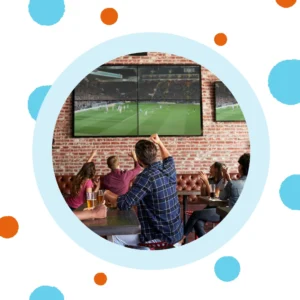
Behind the Ear Hearing Aid Tech | The Best from Injoy
If hearing aids were vehicles, behind-the-ear (BTE) hearing aids would be the tank in the group—strong, durable, and equipped with serious tech muscle. These devices

Smoothly sailing through conversations, enjoying music, and participating fully in social activities — these are some of life’s joys that we often take for granted until our hearing begins to wane. If you’ve been experiencing difficulties understanding others or noticing a decline in your ability to hear clearly, it may be time to consider seeking a hearing solution. Let Injoy Hearing accompany you on this journey toward rediscovering the wonders of sound. Take our online hearing test for greater insight into your hearing problems, and keep reading to learn more about when you need hearing aids.
Table of Contents
ToggleIdentifying the signs of hearing loss is crucial in determining when to seek hearing aid solutions. Some common signs include:
When someone with undiagnosed hearing loss has challenges with their communication ability and finds their overall quality of life declining, it’s important for them to have their hearing professionally tested. Not only will it confirm their challenges, but it will give them an idea as to how severe their hearing loss is. Therefore, understanding the degrees of hearing loss is a crucial step in addressing the issue promptly and seeking appropriate solutions.
Mild Hearing Loss: 20-40 decibels
In the early stages, where sounds become less clear or muffled, conversations and low-volume sounds may become difficult to comprehend. Hearing aids can help amplify these sounds and improve clarity.
Moderate Hearing Loss: 41-60 decibels
As hearing loss progresses, distinguishing speech in noisy environments becomes challenging. Conversations may need to be repeated, and higher volume settings become necessary. With hearing aids, individuals can better differentiate speech from background noise in these situations.
Severe Hearing Loss: 61-80 decibels
At this stage, understanding everyday conversations becomes strenuous, even in quiet environments. Communication difficulties can lead to frustration and social withdrawal. Hearing aids, in combination with other assistive technologies, can help individuals overcome these challenges and regain their ability to communicate effectively.
Profound Hearing Loss: 81 decibels
Individuals experience severe hearing loss, and even loud noises become difficult to perceive. Communication often relies on alternative means such as sign language or advanced assistive devices. For those with profound hearing loss, cochlear implants or other implantable devices may be recommended in addition to or instead of hearing aids to restore auditory perception.

Exposure to loud environments and high-decibel noises can put your hearing at risk. Sustained exposure to sounds surpassing 70 decibels (dB) for long periods of time can lead to noise-induced hearing loss, which may be preventable or mitigated through the use of hearing protection.
Working in environments with high decibel levels can have a significant impact on our hearing health. It’s essential to be aware of these high-decibel environments and take the necessary precautions to protect our hearing. If you work or have worked in the following industries and are hard of hearing, you may want to consider hearing aids.
Construction: Construction sites are known for loud, high-decibel noises from machinery, equipment, and power tools. Workers in this industry are at a higher risk of developing noise-induced hearing loss.

Manufacturing: Factories and manufacturing plants often have noisy machinery, such as conveyor belts, assembly lines, and heavy equipment, which is why employees in these environments should take measures to protect their hearing.
Aviation: Aircraft maintenance and ground crew personnel are exposed to high-decibel noises from engines and aircraft take-offs and landings. Constant exposure to these loud sounds can cause irreversible hearing damage.
Entertainment: Jobs in the entertainment industry, including musicians, DJs, and sound engineers, involve working in loud environments such as concerts, clubs, and studios. Continuous exposure to high-decibel music and crowd noise puts them at risk of hearing loss.
Military: Military personnel, especially those serving in combat or training exercises, are exposed to gunfire, explosions, and other loud noises. These sudden, intense sounds can result in immediate and permanent hearing loss.
Mining: Miners work in environments with heavy machinery, drilling, and blasting operations, creating high noise levels. Prolonged exposure to these loud sounds can lead to hearing impairment or tinnitus.
Emergency Services: Firefighters, police officers, and paramedics often encounter sirens, alarms, and other loud sounds during emergency responses. Repeated exposure to these high-decibel noises can impact their hearing over time.
Wearing hearing aids can offer numerous benefits for individuals experiencing hearing loss, from allowing you to hear to enhancing your auditory processing and brain function. Here are some compelling reasons to consider using hearing aids:
Improved Communication: Tired of saying, “What?” Hearing aids help amplify sounds, making it easier to hear and understand speech.
Enhanced Quality of Life: Better hearing allows for greater enjoyment of social activities, increased confidence, and improved overall well-being.
Prevention of Cognitive Decline: Hearing loss has been linked to cognitive decline and an increased risk of conditions such as dementia. Wearing hearing aids can help prevent or slow down these cognitive impairments by providing better auditory stimulation to the brain.
Reduced Tinnitus Symptoms: Tinnitus is a common condition characterized by perceiving ringing, buzzing, or other phantom noises in the ears. Hearing aids can help minimize the impact of tinnitus by masking bothersome sounds with more pleasant ambient noise.
Safety and Awareness: Wearing hearing aids allows individuals to stay alert to their surroundings, making them more aware of potential dangers and hazards.

Certain environments pose specific challenges for individuals with hearing loss. Being aware of these situations can help determine when hearing aids should be worn:
Social Gatherings: Noisy environments, such as parties or restaurants, can make it difficult to follow conversations. Hearing aids can improve speech understanding by amplifying sounds and reducing background noise.
Workplaces: Jobs in industries with loud machinery or frequent verbal communication may require individuals with hearing loss to utilize adult hearing aids for effective communication and safety.
Public Settings: In crowded places like shopping malls, restaurants, and theaters, wearing hearing aids can enhance your ability to understand speech and navigate through noisy environments.
Educational Settings: If you’re a student or attending classes, wearing hearing aids ensures you can hear clearly during lectures, discussions, and group activities, to foster an optimal learning experience.
Consistency is key when it comes to hearing aid usage. Ideally, you should wear your hearing aids from when you wake up to when you go to bed. By doing so, you can enjoy a seamless listening experience throughout the day and minimize communication challenges.

Every individual’s hearing loss is unique, and finding the best hearing aids requires careful consideration of personal needs and preferences. Here are some factors to consider when choosing a hearing aid:
Degree of Hearing Loss: Ensure the selected device is suitable for your specific level of hearing loss. Injoy hearing aids are ideal for those with mild to severe hearing loss.
Lifestyle: Consider your daily activities and environments to determine if the functionality will enhance your hearing ability and provide convenience and comfort.
Technology and Features: Features such as noise reduction, tinnitus masking, self-adjustability, Bluetooth connectivity, and rechargeable batteries are key aspects you’ll want to consider when choosing a hearing aid.
Read more about the best hearing aids for seniors.
If you suspect you may be experiencing hearing problems or are unsure about the severity of your hearing loss, it’s essential to get your hearing checked. At Injoy Hearing, we offer a free online hearing test to help you learn more about your hearing and what advanced hearing aids would do for your quality of life. We also provide comprehensive consultations by experienced professionals who guide you toward the best hearing solutions for your unique needs. Don’t delay — take the first step toward improved hearing and a better quality of life today!
Identifying when you need hearing aids can significantly improve your hearing experience and overall well-being. Remember, regaining your hearing is not just a solution; it’s an opportunity to rediscover the joy of sound. Take action today with a free consultation with Injoy Hearing. Then, you can enjoy life’s beautiful sounds to the fullest during our risk free hearing aid trial! Contact us today to learn more.

If hearing aids were vehicles, behind-the-ear (BTE) hearing aids would be the tank in the group—strong, durable, and equipped with serious tech muscle. These devices

Noise-induced hearing loss isn’t just something that happens to rockstars and airport runway workers. It’s also what happens when you crank your earbuds to 11,

When it comes to AI-powered hearing aids, ReSound Vivia and Phonak Sphere Infinio stand out. Both are prescription-only, professionally programmed devices designed for people who

So, you’ve finally got hearing aids. Cue the applause—from actual people this time, not just your inner monologue. But if you thought you’d put them
Injoy specializes in crafting custom Phonak hearing aid solutions tailored to the unique hearing needs of our patients. With a team recognized as the best in the business and decades of experience in helping people nationwide, we’re dedicated to improving your hearing and, consequently, enhancing your quality of life.
To start your journey towards better hearing with confidence, Injoy is proud to offer a 30-day risk-free hearing aid trial. This allows you to experience the difference our Phonak hearing aids can make, ensuring they meet your expectations and fit your lifestyle perfectly.
Improve your hearing and improve your life today by contacting Injoy to learn more about our risk-free trial!

Need hearing aids? Explore our range of hearing aids and discover the best option for your lifestyle and Unique Hearing Needs.
Are you a current patient with us? We're here to help with any adjustments, repairs, or support you may need.